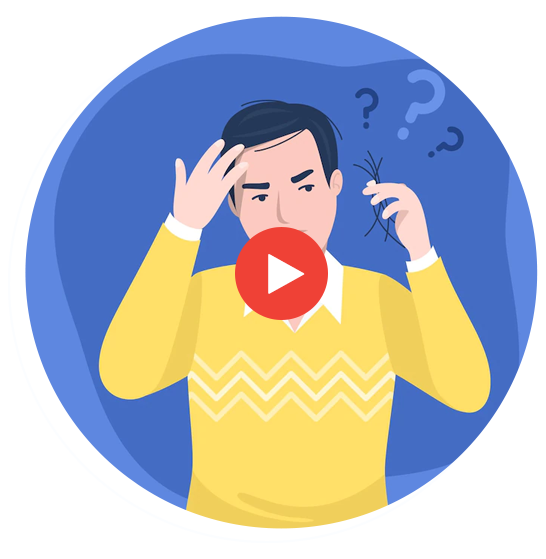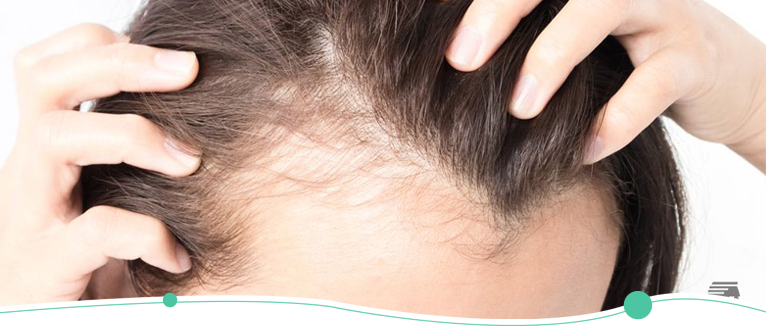

TELMDCARE
What is Hair loss?
Hair loss is the gradual and progressive loss of hair from the scalp and is a common problem in the US. Many people experience it early in their twenties, but it can persist throughout their lifetime.
It may also be caused by medical conditions such as male pattern baldness (androgenetic alopecia) and female pattern hair loss (hirsutism). A common reason behind hair loss is thinning of the scalp, which can ultimately lead to hair falling out.
We say this because the hair on the head is made up of several different types of cells, each of which has its function. Upon death, many hairs split up into single segments. In addition, each follicle has growth centers that produce stem cells that, under normal circumstances, will form into new follicles with new hairs growing from them. As these two processes slow down with age and repeated damage to the scalp causes cells to become damaged or inactive, more hair starts growing into single segments or falling out altogether.
So, if you feel like your hair has stopped growing or is falling out, there's a good chance that it's manageable. Hair loss can happen naturally, such as in menopause, or due to problems caused by illnesses, such as HIV. But it might also point to underlying issues with the health of your scalp. Therefore, it's important to consult avirtual doctor for hair loss and get hair loss treatment online.
Book an Appointment for Only
TELMDCARE
Is covered by many popular
insurance plans

TELMDCARE
Signs Of Hair Loss
Your hair loss is a sign of something wrong. It's not just a matter of vanity but rather something that requires medical attention. The most common causes of hair loss are:
If you notice any signs of hair loss, it's important to get hair loss treatment online from an online doctor at TelMDCare before it becomes more severe.
What Are The Early
Signs Of Hair Loss?
Your hair loss is usually the first thing people notice about you. It's a fact of life, but you can do something about it! Early signs of hair loss include:
Prevention Of Hair Loss
The best way to prevent hair loss is by taking care of your scalp, making sure it stays healthy. Here are some tips for preventing hair loss:
When To Consult AVirtual Doctor
For Hair Loss Treatment
The hair loss problem can be very frustrating and worrisome. It can lead to depression, low self-esteem, and even isolation. The symptoms of hair loss are usually not noticeable instantly and it may take years for you to notice that you are losing your hair.
There are many types of hair loss disorders, including alopecia areata, alopecia totalis, telogen effluvium, traction alopecia, and male pattern baldness. The most common type of hair loss you are likely to experience is male pattern baldness which affects 50% of all men over the age of 65.
Hair loss can also have a serious impact on your career as well as personal relationships with family members and friends. If you're experiencing severe hair loss, seek medical advice immediately so you can get hair loss treatment online as soon as possible.
TELMDCARE
As Seen On


TELMEDCARE
What we treat
We treat a variety of acute and chronic conditions and provide expert medical advice and guidance for our patients.
Read More
TELMDCARE
Causes of
Hair Loss
Hair loss is a common problem that affects millions of men and women around the world.
The cause of this problem can be traced back to the environment in which your body lives. So, let's look at some of the most common causes of hair loss:
Hair loss can be caused by hormonal changes, such as those related to pregnancy or menopause. Irregular periods or periods that last longer than usual may also cause hair loss. Other signs of hormonal change include breast tenderness and vaginal dryness.
Hair loss can be a sign of a nutritional deficiency, such as a lack of vitamin A, B vitamins, or iron. Nutritional deficiencies can also result from an illness or medication side effects.
Hair loss also may be caused by an unhealthy diet, which includes high levels of salt, sugar, and carbohydrates in your diet. Certain foods like alcohol and caffeine also cause chronic dehydration, which can lead to thinning hair and dandruff flakes on your scalp.
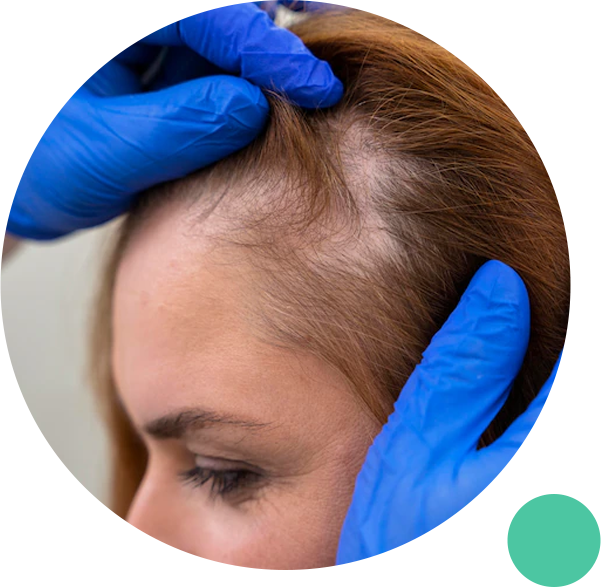
Drugs used to treat cancer, heart disease, and high blood pressure can cause hair to fall out. Diseases such as thyroid problems, lupus, and diabetes may also trigger hair loss as part of their symptoms. Other medications, such as antibiotics or those that contain hormones like birth control pills or hormone replacement therapy for menopause symptoms, may also contribute to thinning hair if taken for an extended period or in high doses
Hair loss can also occur as a part of a genetic condition that affects about 50 to 80 percent of men. While the exact cause of this condition isn’t clear, it appears to be linked to genes on chromosome 17. When these genes are mutated, they interfere with the development of hair cells in the inner root sheath (also known as the bulge).
Medication services available 24/7 for adults and kids (3+)
Top quality, board-certified doctors
No insurance needed
Same-day prescriptions available*
*Prescriptions provided at doctor’s discretion.
TELMDCARE
Factors Contributing To Hair Loss
There are many factors that can contribute to hair loss, including:
- Hormones: If you're on birth control pills, this might cause your hair to thin out.
- Excessive heat: Exposure to hot temperatures can damage your follicles and lead to hair loss.
- Medications: Certain drugs and supplements can cause hair loss in some people.
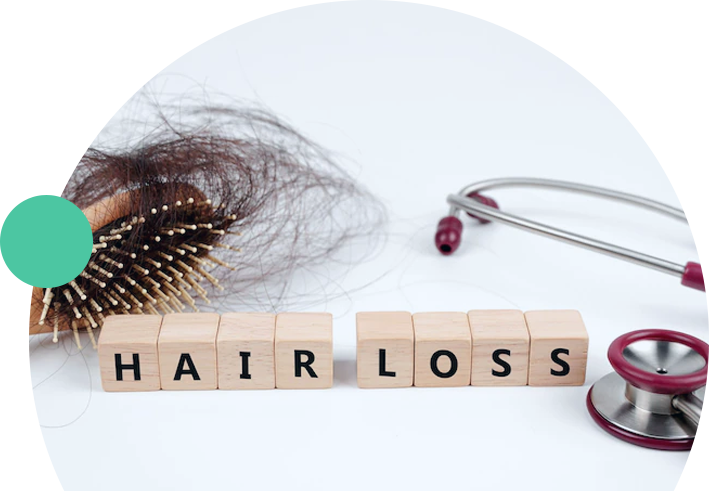
TELMDCARE
Hair Loss
Treatment Options
Different medications can be used for different types of hair loss, including androgenetic alopecia (pattern balding), telogen effluvium (acute shedding), and traction alopecia (pulling at the scalp). In this type of medication, you take a pill once or twice a day for several months. It's called finasteride or dutasteride. It’s also available as a generic drug called Propecia or Proscar. These drugs work by lowering levels of estrogen in your body, which causes your hair follicles to shrink back down into the skin where they should be — not on top of it like they normally would be during the normal growth phase of your hair’s cycle. If you have been experiencing symptoms such as thinning hair, frequent shedding, and/or irritation from dryness and itching, an online doctor for hair loss may recommend this type of medication.
Laser therapy is one of the most popular hair loss treatment options. It uses low-level laser energy to stimulate the growth of new hair follicles. Laser therapy is effective because it targets both hair loss and baldness at once. Laser therapy can be used in conjunction with medications or other treatments to help improve your chances of regrowth.
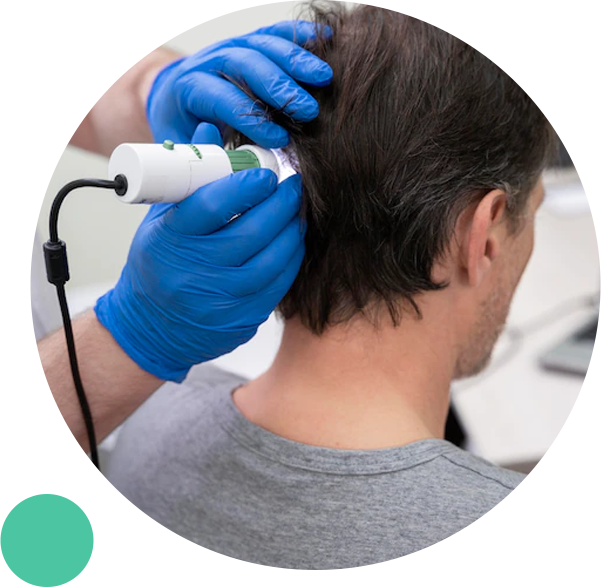
Hair transplant surgery is a procedure that involves removing hair from the back and sides of the head and placing it on areas where there is a bald spot. The hair is then transplanted into the balding area. Hair transplant surgery can be performed to treat various types of hair loss, including pattern hair loss, alopecia areata, and autoimmune alopecia. The procedure can also be used with other treatments for male pattern baldness, such as minoxidil or finasteride.

Get Affordable and Reliable Hair Loss Treatment Online
At TelMDCare
TelMDCare is one of the most reliable online platforms for health care that provides affordable and reliable treatment for skin diseases, including dandruff, hair loss, and acne. Our team of qualified internal medicine and family doctors provides quality treatment for dandruff online, starting at just $43.
Our doctors have years of experience in treating different types of hair problems and disorders, such as alopecia, hair fall, thyroid disorders, excessive sweating, and many more.
Talk to our experts about hair loss treatment online at TelMDCare with the help of our online consultation system.
Signup to schedule an appointment or call us anytime you want to know more about our services or ask any other questions related to hair loss treatment.
TELMDCARE
Sign Up
Sign up and book an appointment with our specialists to get hair loss treatment online today!
$43 SIGN UP
TELMDCARE
FAQs For Hair loss
Yes, there are some things you can do to reduce the possibility of developing a bald spot or thinning on top of your head. These include applying hair nourishment serums to your scalp, always wearing a baseball cap or a hat to shade your head from the sun's harmful UV rays, and not coloring your hair too often or too darkly. You should also avoid using harsh chemicals on your skin, like shampoos and soaps that contain sulfates and phosphate compounds.
The most common symptom of hair loss is the thinning of your hair. You may also notice that your hair is falling out in clumps or looks like it's not attached at all. Similarly, itching on the scalp may also be an early sign that you're losing more than the normal amount of scalp from an underlying health problem like dandruff or seborrheic dermatitis (an inflammatory condition that occurs primarily in areas of the body covered by oil glands). The only way to be sure if you have any signs of hair loss is to consult a doctor who specializes in hair loss.
There are many different types of baldness, including androgenetic alopecia (male-pattern baldness) and female-pattern baldness. However, certain conditions can increase your risk for hereditary male pattern baldness or female pattern baldness, including poor diet, using harsh soaps and chemicals on the scalp, and aging. If you're experiencing these symptoms, speak with our online doctor for hair loss.



